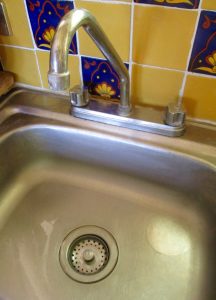Marcus, the plumber for the apartment complex where I live in San Miguel de Allende, Mexico, arrived one day last week to fix a leak in my kitchen sink.
Marcus is tall for a Mexican man – maybe 6’1” or so – tall enough to make me feel small. (I used to be 5’7”, but I’ve shrunk two inches in recent years.) And he makes me feel a little helpless, too, because though I pride myself on self-sufficiency, I must admit I have zero plumbing skills, nor the equipment. I must rely on him for all that.
His work clothes, patched and raggedy, look like they haven’t seen the inside of a washing machine in many days. His once-blue (I think) backpack containing his plumbing tools is falling apart.
But his smile is meltingly sweet, the smile of an adorable little boy — though I know he’s nearing sixty. He once told me.
His English is far better than my Spanish, so we speak primarily in English.
“So good to see you again!” he greeted me, smiling, when I let him in. “You have a leak?”
It’s been a while since I’ve had visitors in my studio apartment on the azotea (rooftop, where the laundry is hung), especially the kind of visitor who has a deep voice and broad shoulders. My knees began to feel weak. Seeing Marcus reminds me that I’m not dead yet.
Maintaining a sana distancia (healthy distance) from him, I showed Marcus the problem. He went right to work, while I watched. We made small talk. Some women are said to have a soft spot for cowboys. For me, it’s men who can make things and fix things that I can’t. I watched Marcus the way I used to watch my big brother build model airplanes from balsa wood when I was a little girl: transfixed.
Small talk extinguished, I went for the bigger stuff:
“So what do you think about this coronavirus pandemic?” I asked him.
He turned from the sink, where he’d just tightened the new whatever-you-call-it at the base of the faucet.

“Oh,” he said, seeming to gather his thoughts. “Well. Look…” He pointed out of my west-facing windows. “See how clear the mountains are in the distance? Less cars means less pollution. That’s good! I think when this pandemic has passed, maybe things will be better than before! Maybe people will have learned good lessons!” He shrugged his broad shoulders and smiled his little-boy smile.
“Maybe,” he stressed.
Then I gave him one of the face masks I’ve made in baby-blue bazin fabric from Mali. He took it and held it close to his dirty shirt, near his heart.
“You’ve made my day,” he said, smiling.
And you, mine, I thought.
It seems to me that we anxious Americans can learn a lot from most Mexicans’ philosophy of rolling with the punches. Living closer to the ground, many of them have less far to fall. And the fabric of their familial ties tends to be stronger than ours, I think. Admirable – and enviable.
COVID-19 has yet to pack a wallop here. As I write this – if the numbers can be trusted – there are only nine confirmed cases in San Miguel de Allende. (In all of the state of Guanajuato, Mexico, where San Miguel is located, there are 158 confirmed cases to date; whereas, in comparison, deaths from the coronavirus in New York State have already surpassed 15,000.) Nevertheless, the authorities here continue to take all precautions. And more and more, I observe, people are fully complying with these new rules.
Hope, I’d say, is higher than fear or anxiety.
This virus will pass in time. Hot air balloons will rise again over this city every morning, taking tourists up for the rides of their lifetimes. Colorful celebratory fireworks will light up the night sky again on weekends. Church bells will chime every Sunday. Fancy, open, horse-drawn carriages will once again carry a new bride and groom from their Saturday afternoon wedding ceremony in the Paroquia to their reception destination. My extroverted puppets, now scrunched together in a closet, will once again return to their schoolroom stage.
Well, maybe.
In the meantime, we all, everywhere, must hope.
And, like Marcus, try our best to smile.
